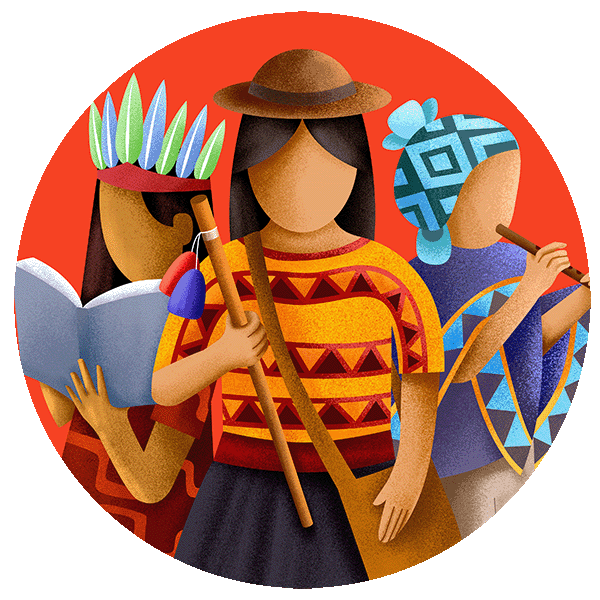
International Day of The Worlds Indigenous Peoples - Leave No One Behind
There are over 476 million Indigenous Peoples living in 90 countries across the world, accounting for 6.2 percent of the global population. Indigenous Peoples are the holders of a vast diversity of unique cultures, traditions, languages, and knowledge systems. They have a special relationship with their lands and hold diverse concepts of development based on their own worldviews and priorities.
In this radio program, we hear from Nailejileji Tipap, who works as the Gender and Public Relations Coordinator at Pastoralists Indigenous NGOs Forum in Tanzania.
Human Trafficking In Nepal
Human trafficking is one of the most difficult issues to address in Nepal, affecting and exploiting thousands of women, adolescent girls, and children. Indigenous women and girls are disproportionately affected by human trafficking and represent almost 70 percent of the cases. Indigenous women and girls make up the majority of the people trafficked and exploited. Following the 2015 earthquake in Nepal, economic opportunities have been severely impacted and the numbers of missing women and girls including children have risen sharply.
Martinus Fredericks On Germany - Namibia Compensation Agreement
The state of Germany has agreed to compensate the state of Namibia, by means of a development fund of 1.4 billion Euros, over 30 years. How will this agreement benefit the descendents of the victims of the thousands of people who were tortured and murdered by the colonial rulers of the South Western African country of Namibia, in the early 1900's.
Diana Morat from Eldos FM, a community radio station in Johannesburg, South Africa interviews Martinus Fredericks, a direct descendent of Cornelius Fredericks, who was a Nama leader who fought along Kaptein Hendrik Witbooi.
Kenneth Deer on the United Nations Permanent Forum on Indigenous Issues
"Peace, justice and strong institutions: the role of indigenous peoples in implementing Sustainable Development Goal 16". That is the theme for the 20th session of the United Nations Permanent Forum of Indigenous Issues. The Forum was established on 28 July 2000 by resolution 2000/22, with the mandate to deal with Indigenous issues related to economic and social development, culture, the environment, education, health, and human rights. Cultural Survival spoke to Kenneth Deer (Mohawk) about the history and work of the Permanent Forum.
Image: Kenneth Deer
UNPFII - Past, Present, and Future - An Interview With Andrea Carmen
The United Nations Permanent Forum on Indigenous Issues (UNPFII) is a high-level advisory body to the Economic and Social Council. The Forum was established on 28 July 2000 by with the mandate to deal with indigenous issues related to economic and social development, culture, the environment, education, health, and human rights.
Andrea Carmen (Yaqui) from the International Indian Treaty Council was there in the beginning, and in this radio program, she tells us all about the history of the forum, the present state of the forum, and the forum of tomorrow.
The Military Coup in Myanmar and Its Impact on Indigenous Peoples
February 1, 2021, the day on which the newly elected parliament had scheduled its first official parliamentary session in Myanmar after the election held in November 2020. Just hours before the scheduled sessions, the military conducted a house-raid and arrested several elected leaders and politicians, including Aung San Suu Kyi, politician, diplomat, author, and a 1991 Nobel Peace Prize laureate, and president Win Myint and other senior government figures. The Myanmar military then declared a state of emergency and imposed curfews putting restrictions on public gatherings.
Migration And Urbanization - An Interview With Job Morris From San Youth Network Of Botswana
December 18th is International Migrants Day – in this radio program, we look at factors that cause the migration of Indigenous Peoples, and we also explore some of the impacts of migration.
We spoke to Job Morris, from the San Youth Network, who tell us about the impacts of urbanization on San communities in Botswana that have resulted because of migration.
Produced by Shaldon Ferris (Khoisan, South Africa)
Interviewee Job Morris (Ncao Khwe (San), Botswana)
Reclaiming What Belongs To Us - Khoi And San At Table Mountain
In October 2020, a group of people representing different Khoi and San Tribes gathered at the foot of Table Mountain in South Africa. There they have created a cultural space where they will stay for an indefinite period of time in an effort to reclaim the mountain. With the temporary huts providing a little shelter, and fire providing a little warmth, they are making it known that the mountain and the area surrounding it had once belonged to their ancestors. Bradley van Sitters is among the folks camped out at the foot of the mountain.
Les Malezer on Commemorating UNDRIP
On September 13 we commemorate the anniversary of the adoption of the Declaration on the Rights of Indigenous Peoples by the United Nations.
The Declaration is an instrument to enshrine the rights that constitutes the minimum standards of survival, dignity and well-being of Indigenous peoples around the world.
International Day Of The Worlds Indigenous Peoples 2020 - A Conversation With Francisco Cali Tzay
The COVID-19 pandemic has already posed a grave health threat to the world's Indigenous Peoples as they already experience poor access to essential healthcare services. Indigenous Peoples globally are seeking their own solutions to this pandemic. Indigenous Rights Radio program producer Dev Kumar Sunuwar caught up with Francisco Cali Tzay, the newly appointed UN Special Rapporteur on the Rights of Indigenous Peoples who discussed COVID-19’s impacts on Indigenous communities.
